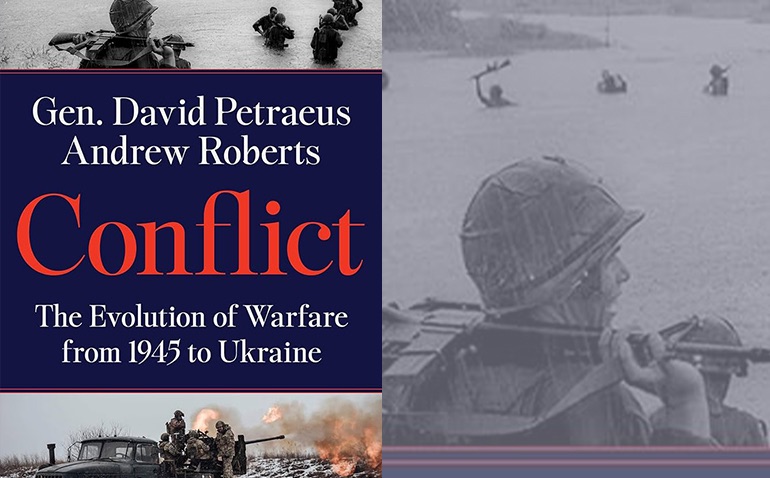
BPF Book Review of “Conflict: The Evolution of Warfare from 1945 to Ukraine”
With the 79th anniversary of VE Day just past and the 80th anniversary of D-Day just ahead … with two hot wars boiling over in Europe and the Middle East … with billions’ worth of America’s armaments and ammunition being shipped to both fronts, it seems like a dang good time to breakout our Kevlar gear and get combat ready. Fortuitously, there is a book recently published with exactly this task in mind. Conflict: The Evolution of Warfare from 1945 to Ukraine by General David Petraeus and Andrew Roberts was published in late 2023. It is written in the spirit of the old but famous quote from George Santayana, “Those who cannot remember the past are condemned to repeat it.”
Conflict‘s two authors are eminently qualified on the subject of warfare over the past 80 years. Andrew Roberts is a prolific military historian and biographer from Britain who also serves as a Visiting Fellow at the Hoover Institute at Stanford. General Petraeus served as an advisor to Presidents G.W. Bush and Obama and was a combat commander in Iraq and Afghanistan. He is also a former Director of the CIA. Of special note for this book, a young Major Petraeus in 1987 earned his PhD from Princeton. His dissertation was “The American Military and the Lessons of Vietnam: A Study of Military Influence and the Use of Force in the Post-Vietnam Era.” It was a thesis that turned into a career path for the young major. In one sense, Conflict is a grand sequel to that PhD thesis with an additional 50 years’ worth of small wars, guerrilla actions, terrorist campaigns, insurgencies, counterinsurgencies and cyber warfare from before and after Vietnam added to the discussion. While most of those conflicts were far from U.S. shores, there are still critical lessons for America’s leaders to learn.
Conflict is a valuable resource for scholars, soldiers and political leaders. Military history buffs will appreciate the detailed summaries of many lesser-known small wars. The chapter, “Wars of Decolonization 1947-1975” is a prime example. The chapter points out that by 1914 European nations controlled 84% of the world’s land mass, but between 1943 and 1975 the largest transfer of territorial control in world history took place as all of the Western European empires were swept away. WWII had left the European countries in ruble, emotionally exhausted and financially drained. The historic breakup of those empires took decades of smaller wars fought in obscure locations under terrible and trying conditions. The outcomes shaped much of the world we live in today. Understanding the history of that global transformation is an important skill set for dealing with the complexities and chaos that the world still grapples with in the 21st century.
But the convulsions that disrupted the world’s mapmakers didn’t end in 1975. The collapse of the Soviet Union and its ramifications are covered in the chapter, “The New World Disorder 1991-1999.” That also left an empire in disarray followed by decades of the trauma and turmoil of more small wars.
The authors of Conflict do a masterful job of profiling some of the leaders who understood the context of their conflicts, got the “big ideas” right and succeeded as well as some of those who didn’t and failed. A recurring theme in Conflict is the need for leaders to appeal to and win the hearts and minds of the indigent populations. This is especially true in counter insurgencies. It was a shortcoming of America’s strategy in Vietnam.
Warfare has evolved dramatically since 1945. Our political leaders and their military advisors should makeConflict mandatory reading.
Sign up for BPF’s latest news here.
